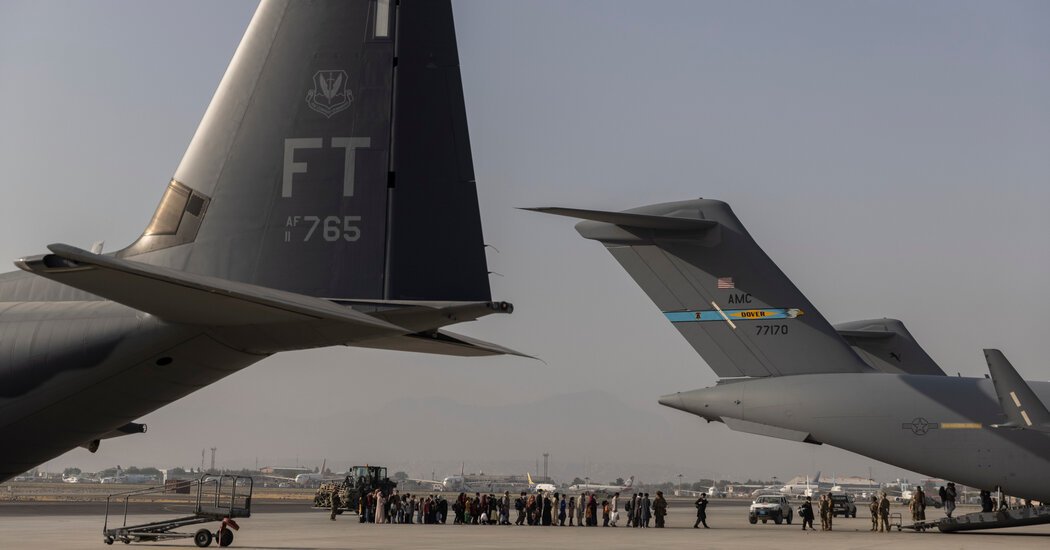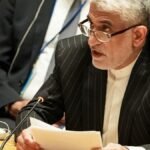The State Department abruptly canceled travel for thousands of refugees who had already been approved to enter the U.S., days before a deadline President Trump had set to suspend a resettlement program that has been accused of persecution. Provides safe haven to people fleeing persecution.
The flight cancellations come after an executive order signed by Mr. Trump on Monday that halted refugee resettlement indefinitely. The order effectively halts the process of bringing immigrants into the country, which involves multiple federal agencies as well as nonprofit organizations that receive newcomers.
More than 10,000 refugees were currently in the pipeline to the United States, according to official figures. These include Afghans who faced threats because of their ties to the United States before the military withdrawal from Afghanistan. Other refugees who were approved for travel included people from Africa, Latin America and the Middle East.
Activists at the resettlement group said the sudden suspension of flights was a painful blow to migrants who were following a complicated and lengthy process to enter the country legally.
Angela Plummer, executive director of Community Refugee and Immigration Services, a refugee resettlement agency in Columbus, Ohio, said the organization was expecting dozens of arrivals on the flights that were suspended.
“These are the people who followed all the rules and who are now at risk,” Ms Plummer said. “It’s heartbreaking.”
The decision to freeze the refugee program comes in line with Mr. Trump’s promise to crack down on immigration in a broad way.
Under the decades-old refugee program, people who have fled their countries of origin as a result of persecution, war or other life-threatening causes can legally immigrate to the United States. Mr Trump said continuing to receive them would burden communities not equipped to handle them, according to the order he signed on Monday.
The State Department followed up his order with a memo on Tuesday that said “all previously scheduled travel for refugees to the United States is being canceled, and no new travel bookings will be made. ” Organizations, such as the International Rescue Committee and others that assist refugees, “should not request travel for any additional refugee cases at this time,” he noted.
On Wednesday, U.S. refugee officers at Homeland Security agencies such as U.S. Citizenship and Immigration Services were asked to stop making decisions on refugee cases, according to an internal memo obtained by The New York Times.
The news that the Trump administration had canceled travel even for refugees already cleared to resettle in communities across the U.S. shocked leaders of nonprofits contracted by the State Department to help newcomers. To help those.
“This sudden freeze on refugee admissions is devastating for families who have already endured unimaginable persecution and to secure their lives,” UNHCR chief Krish O’Mara Wignaraja said in a statement. Years of waiting.”
“Refugees go through the world’s toughest screening process,” he continued, “and it’s heartbreaking to see their dreams of protection derailed days before, or in some cases, A few hours before starting your new life. Here.”
“Many people have been waiting years, and in some cases decades, in refugee camps and diligently through the refugee process to receive permission to travel,” said Alexander Negash, president of the American Committee for Refugees and Immigrants. passed through.”
“Even if the refugee program is reopened in the future, the indefinite suspension of refugee travel and processing will have lasting trauma and impact on refugees and families,” he said.
Ms Plummer said her group has been fielding calls from distraught clients who have waited years for their relatives to be reunited, only to realize the prospect of reunification is now bleak.
Among them is Noor Ahmed, who arrived in Columbus in 2010 after fleeing the civil war in Somalia. He sponsored his child, young sister and mother to join him.
His case stalled during Mr Trump’s first term as president.
Mr Ahmed’s son and sister, both in their 20s, arrived shortly before returning to the White House last week. But his mother, 70, was due early next month, and her arrival could be postponed indefinitely.
“I am very lucky that my son and sister reached there but I am sorry that my mother is left behind,” he said.
Often members of the same family are assigned different travel dates, and in this case it can mean several more years of separation.
“Trump delayed us first; now he’s back and he’s delaying again,” said Mr Ahmed, a cross-country truck driver. “I’ve just been feeling the pain since Donald Trump came back.”
“I haven’t seen my mother since I left, and I don’t know when I’ll see her again,” he said in an interview while picking up dry food on a highway in Texas.
As part of an avalanche of executive orders to reduce immigration, Mr. Trump suspended the refugee resettlement program on Jan. 27. Officials from resettlement agencies had hoped that refugees who had completed the year-long process and booked flights would still be able to make it. Travel to the United States.
In his first administration, Mr. Trump dismantled the refugee program by imposing additional layers of vetting on applicants he deemed to pose security risks and lowering the target number the U.S. was willing to take. .
Presidents annually determine how many refugees the United States is willing to accept in a given year, and the numbers vary, with Republican presidents historically setting some of the highest caps.
However, the number of refugees entering the country fell to a record low of about 11,000 in 2020, down from 85,000 in 2016 under President Barack Obama, Mr Trump’s last year in office. Mr Trump favored religious minorities, particularly white Christians from countries such as Moldova and Russia.
President Biden rebuilt the program, and refugee admissions surged, reaching 100,000 last year, the most in three decades.
This time, Mr. Trump has justified suspending refugee admissions on the grounds that they strain the resources of cities that need to benefit Americans.
The executive order, which was signed by Mr. Trump, said, “The United States does not have the capacity to absorb large numbers of immigrants, and especially refugees, into our communities in a way that the resources available to Americans can afford.” But does not compromise.” Its opening hours.












































